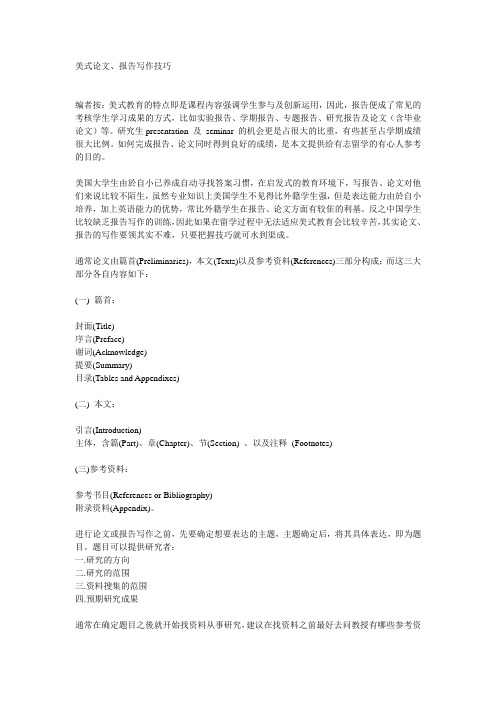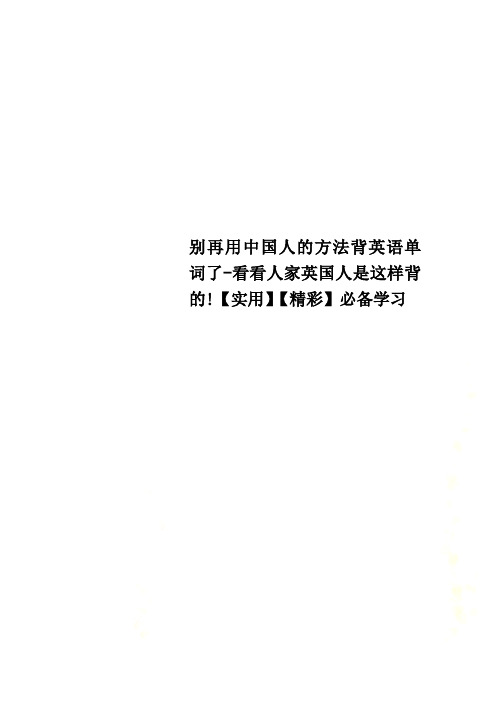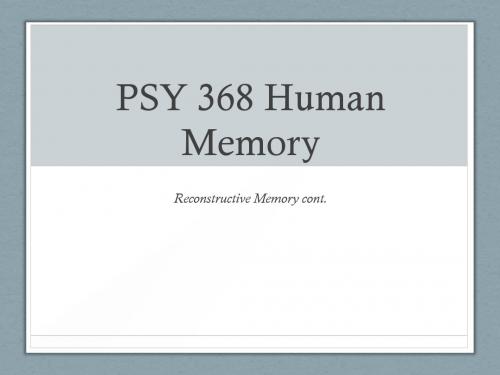国外人类记忆memorypresentation
- 格式:ppt
- 大小:1.01 MB
- 文档页数:28

关于记忆力的演讲稿英文Memory is a fascinating and complex aspect of human cognition. It allows us to store and retrieve information, experiences, and skills, shaping who we are and how we interact with the world around us. In today's speech, I would like to discuss the importance of memory and share some tips for improving and maintaining memory function.First and foremost, it is essential to understand the significance of memory in our daily lives. Memory is crucial for learning, problem-solving, decision-making, and creativity. It enables us to recall past events, recognize familiar faces, and navigate our surroundings. Without memory, our ability to function and thrive in the world would be severely compromised.Now, let's explore some strategies for enhancing memory. One effective approach is to engage in regular mental exercises, such as puzzles, brainteasers, and memory games. These activities stimulate the brain and promote the formation of new neural connections, which can improve memory retention and recall.Additionally, maintaining a healthy lifestyle is vital for optimal memory function. Adequate sleep, regular physical exercise, and a balanced diet contribute to overall brain health. Sleep is particularly important for memory consolidation, as it allows the brain to process and store information gathered throughout the day.Furthermore, practicing mindfulness and stress-reduction techniques can benefit memory. Chronic stress has been shown to impair memory and cognitive function, so finding ways to manage stress, such as meditation or yoga, can have a positive impact on memory performance.Moreover, establishing routines and using mnemonic devices can aid in memory retention. Routines create a sense of structure and predictability, which can help encode and retrieve information more effectively. Mnemonic devices, such as acronyms or visual imagery, provide mental cues that facilitate memory recall.In addition to these strategies, staying mentally active and continuously learning new things can support memory function. Engaging in lifelong learning, exploring new hobbies, and seeking out intellectual challenges can help maintain cognitive vitality and prevent memory decline.In conclusion, memory is a fundamental aspect of human cognition that shapes our experiences and interactions with the world. By understanding the importance of memory and implementing strategies to enhance and maintain it, we can optimize our cognitive abilities and lead more fulfilling lives. I encourage everyone to incorporate these tips into their daily routines and embrace the incredible potential of their memory. Thank you.。

记忆传授人简介英文版The Memory Imparter is an enigmatic and elusive figure, shrouded in mystery and possessing an extraordinary ability to transfer memories from one mind to another. This enigmatic entity has been the subject of countless legends, myths, and whispered tales throughout history.The Memory Imparter is believed to be an ancient being, existing for centuries or even millennia. Its origins are shrouded in obscurity, with some claiming it emerged from a realm beyond human comprehension, while others suggest it is a product of advanced scientific experimentation. Regardless of its genesis, the Memory Imparter possesses a profound understanding of the human mind and its intricate workings.The Memory Imparter's primary function is to facilitate the transfer of memories between individuals. This ability is both awe-inspiring and potentially transformative, allowing recipients to access the thoughts, experiences,and emotions of others. The Memory Imparter can alsoextract specific memories, erasing them from one mind while preserving them for transfer to another.However, the Memory Imparter's power comes with a profound responsibility. The act of transferring memoriesis a delicate and potentially dangerous procedure,requiring immense precision and a deep understanding of the recipient's psyche. The Memory Imparter must navigate the intricate tapestry of the human mind, ensuring that the transferred memories seamlessly integrate without causing harm or confusion.The motives and intentions of the Memory Imparterremain an enigma. Some believe it is a benevolent entity, seeking to impart wisdom and knowledge upon humanity.Others suspect it is a malevolent force, manipulating memories for sinister purposes. The truth likely lies somewhere between these extremes, with the MemoryImparter's actions guided by a complex and enigmatic agenda.Legends abound regarding encounters with the MemoryImparter. Travelers berichten have claimed to have met the entity in remote villages, ancient temples, and even amidst the bustling streets of modern cities. The Memory Imparter often appears as a wisp of smoke, a flickering light, or a fleeting shadow, its presence both ethereal and unsettling.Those who have interacted with the Memory Imparter are forever transformed. The recipient of transferred memories may experience a profound shift in perspective, gaining new insights and experiences that alter their very being. However, the process is not without its risks. Therecipient may grapple with the integration of foreign memories, leading to confusion, disorientation, or even mental distress.The Memory Imparter's true nature remains a mystery, shrouded in layers of myth and speculation. It is an enigmatic entity, possessing the power to shape the very fabric of human memory. Its motives are unknown, and its actions enigmatic. Whether benevolent or malevolent, the Memory Imparter serves as a reminder that the boundaries ofhuman consciousness are far more fluid and malleable than we often realize.。

美式论文、报告写作技巧编者按:美式教育的特点即是课程内容强调学生参与及创新运用,因此,报告便成了常见的考核学生学习成果的方式,比如实验报告、学期报告、专题报告、研究报告及论文(含毕业论文)等。
研究生presentation 及seminar 的机会更是占很大的比重,有些甚至占学期成绩很大比例。
如何完成报告、论文同时得到良好的成绩,是本文提供给有志留学的有心人参考的目的。
美国大学生由於自小已养成自动寻找答案习惯,在启发式的教育环境下,写报告、论文对他们来说比较不陌生,虽然专业知识上美国学生不见得比外籍学生强,但是表达能力由於自小培养,加上英语能力的优势,常比外籍学生在报告、论文方面有较隹的利基。
反之中国学生比较缺乏报告写作的训练,因此如果在留学过程中无法适应美式教育会比较辛苦,其实论文、报告的写作要领其实不难,只要把握技巧就可水到渠成。
通常论文由篇首(Preliminaries),本文(Texts)以及参考资料(References)三部分构成;而这三大部分各自内容如下:(一) 篇首:封面(Title)序言(Preface)谢词(Acknowledge)提要(Summary)目录(Tables and Appendixes)(二) 本文:引言(Introduction)主体,含篇(Part)、章(Chapter)、节(Section) 、以及注释(Footnotes)(三)参考资料:参考书目(References or Bibliography)附录资料(Appendix)。
进行论文或报告写作之前,先要确定想要表达的主题,主题确定后,将其具体表达,即为题目。
题目可以提供研究者:一.研究的方向二.研究的范围三.资料搜集的范围四.预期研究成果通常在确定题目之後就开始找资料从事研究,建议在找资料之前最好去问教授有哪些参考资料来源可供参考引用。
构思为确定写作大纲或Proposal 的先前步骤,大纲是论文、报告的骨干,Proposal 是研究的架构、流程及范围的说明书。


别再用中国人的方法背英语单词了-看看人家英国人是这样背的!【实用】【精彩】必备学习美式论文、报告写作技巧编者按:美式教育的特点即是课程内容强调学生参与及创新运用,因此,报告便成了常见的考核学生学习成果的方式,比如实验报告、学期报告、专题报告、研究报告及论文(含毕业论文)等。
研究生presentation 及seminar 的机会更是占很大的比重,有些甚至占学期成绩很大比例。
如何完成报告、论文同时得到良好的成绩,是本文提供给有志留学的有心人参考的目的。
美国大学生由於自小已养成自动寻找答案习惯,在启发式的教育环境下,写报告、论文对他们来说比较不陌生,虽然专业知识上美国学生不见得比外籍学生强,但是表达能力由於自小培养,加上英语能力的优势,常比外籍学生在报告、论文方面有较隹的利基。
反之中国学生比较缺乏报告写作的训练,因此如果在留学过程中无法适应美式教育会比较辛苦,其实论文、报告的写作要领其实不难,只要把握技巧就可水到渠成。
通常论文由篇首(Preliminaries),本文(Texts)以及参考资料(References)三部分构成;而这三大部分各自内容如下:(一) 篇首:封面(Title)序言(Preface)谢词(Acknowledge)提要(Summary)目录(Tables and Appendixes)(二) 本文:引言(Introduction)主体,含篇(Part)、章(Chapter)、节(Section) 、以及注释(Footnotes)(三)参考资料:参考书目(References or Bibliography)附录资料(Appendix)。
进行论文或报告写作之前,先要确定想要表达的主题,主题确定后,将其具体表达,即为题目。
题目可以提供研究者:一.研究的方向二.研究的范围三.资料搜集的范围四.预期研究成果通常在确定题目之後就开始找资料从事研究,建议在找资料之前最好去问教授有哪些参考资料来源可供参考引用。

关于记忆的英语介绍作文Memory: The Tapestry of the Mind.Memory, the intricate and enigmatic faculty of the mind, weaves the tapestry of our existence, connecting us to our past and shaping our present and future. It is a complexand multifaceted phenomenon that encompasses a vast arrayof cognitive processes, from encoding and storinginformation to retrieving and using it.Encoding and Storage: The Foundation of Memory.The journey of memory begins with encoding, the process by which sensory information is transformed into a formthat can be stored in the brain. This encoding process can be categorized into three main types:1. Acoustic Encoding: Encoding information based on its sound, such as remembering a phone number or a song lyric.2. Visual Encoding: Encoding information based on its visual representation, such as remembering a face or a painting.3. Semantic Encoding: Encoding information based on its meaning, such as remembering the definition of a word or the plot of a story.Once information has been encoded, it is stored in the brain in various memory systems, each with distinct characteristics:1. Sensory Memory: A fleeting memory system that holds sensory information for a very brief period, typically less than half a second.2. Short-Term Memory (STM): A memory system that holdsa limited amount of information for up to 30 seconds.3. Long-Term Memory (LTM): A vast and durable memory system that stores an unlimited amount of information for extended periods.Retrieval: Accessing the Stored Information.Retrieval, the process by which stored information is accessed and brought back into conscious awareness, is as crucial as encoding and storage. There are two main types of retrieval:1. Recall: Actively retrieving information from memory without any external cues.2. Recognition: Identifying previously encountered information when presented with it again.Types of Long-Term Memory.Long-term memory is further classified into two broad categories:1. Explicit Memory: Consciously accessible memoriesthat can be explicitly recalled, such as facts, events, and autobiographical experiences.2. Implicit Memory: Unconscious memories that influence behavior without conscious awareness, such as procedural memories (e.g., riding a bike) and priming effects (e.g., being influenced by recently encountered information).Factors Influencing Memory.Memory is a complex process influenced by numerous factors, including:1. Attention: The more attention paid to information, the better it is encoded and stored.2. Rehearsal: Repeated exposure to information strengthens memory traces.3. Sleep: Adequate sleep is essential for memory consolidation, the process by which memories are stabilized and integrated into long-term storage.4. Emotion: Emotional information is particularlymemorable due to the involvement of the amygdala, a brain region linked to emotion and memory.5. Context: The context in which information is encountered can influence how well it is remembered.6. Interference: New information can interfere with the retrieval of previously stored information, resulting in forgetting.Forgetting: The Ebb and Flow of Memory.Forgetting is an inevitable aspect of memory. It can be caused by several factors:1. Decay: Gradual loss of memory traces over time.2. Interference: Competition between similar memories can lead to forgetting.3. Retrieval Failure: Inability to access stored information due to cognitive limitations.Improving Memory and Overcoming Forgetting.While forgetting is a natural process, there are strategies to improve memory and minimize forgetting:1. Spaced Retrieval: Repeatedly testing oneself on learned information strengthens memory traces.2. Interleaving: Alternating between different learning materials enhances memory compared to studying them in isolation.3. Elaboration: Connecting new information to existing knowledge makes it more meaningful and memorable.4. Chunking: Breaking down large amounts of information into smaller, manageable chunks aids in encoding.5. Mnemonic Devices: Using techniques like acronyms, rhymes, or mental imagery can improve recall.6. Reducing Interference: Separating different learning tasks by time or context reduces interference.Memory and the Aging Mind.As we age, our memory abilities undergo natural changes. Short-term memory capacity may decline slightly, andretrieval speed may slow down. However, research has shown that these age-related changes in memory are often modest and can be compensated for by using effective memory strategies.Conclusion.Memory is a fundamental cognitive faculty that plays a pivotal role in shaping our lives. It allows us to learn from our experiences, navigate our world, and maintain a sense of identity. By understanding the processes of encoding, storage, retrieval, and forgetting, we can appreciate the remarkable complexity of memory and adopt strategies to enhance our own memory capabilities.。
关于记忆英语的英语作文Title: An Essay on Memory in English。
Memory is a fascinating and complex aspect of human cognition. It plays a crucial role in our daily lives, allowing us to store and retrieve information, learn new skills, and form our sense of identity. In this essay, wewill explore the nature of memory, its functions, and the factors that can influence its performance.Memory can be broadly categorized into three main types: sensory memory, short-term memory, and long-term memory. Sensory memory is the initial stage of memory, wheresensory information from the environment is briefly registered. Short-term memory, also known as working memory, holds a small amount of information for a short period of time, allowing us to manipulate and process it. Long-term memory, on the other hand, is the relatively permanent storage of information, which can be retrieved at a later time.The functions of memory are numerous and essential for our daily functioning. Memory allows us to remember past experiences, learn new information, and make decisionsbased on our previous knowledge. It also plays a crucialrole in language comprehension, problem-solving, and decision-making. Without memory, our ability to function in the world would be severely impaired.Several factors can influence the performance of memory. Age is a significant factor, as memory tends to declinewith age, particularly in terms of processing speed and working memory capacity. Genetics also play a role in memory performance, as certain genetic factors caninfluence an individual's susceptibility to memory-related disorders such as Alzheimer's disease. Environmental factors, such as stress, sleep deprivation, and substance abuse, can also have a detrimental effect on memory performance.The study of memory has led to several theories and models that seek to explain its nature and function. Onesuch model is the multi-store model of memory, which posits that information is processed through three distinct stages: sensory memory, short-term memory, and long-term memory. Another influential theory is the levels of processing model, which suggests that the depth of processing at which information is encoded influences its retention and retrieval.In recent years, research in the field of memory has expanded to include the study of memory enhancement techniques and the development of interventions for memory-related disorders. Cognitive training programs, such as working memory training, have shown promise in improving memory performance in both healthy individuals and thosewith memory impairments. Pharmacological interventions,such as the use of cognitive enhancers, are also being explored as potential treatments for memory-related disorders.In conclusion, memory is a fundamental aspect of human cognition that plays a crucial role in our daily lives. Understanding the nature of memory, its functions, and thefactors that can influence its performance is essential for improving memory performance and developing interventions for memory-related disorders. As our understanding of memory continues to advance, so too will our ability to harness its potential for the benefit of individuals and society as a whole.。
Memory Masters: Unlocking the Secrets ofExceptional RecallIn the realm of human capabilities, memory stands as a fascinating and often elusive faculty. While the majority of us struggle to remember even the most mundane details, there exist individuals whose memories seem to defy the laws of ordinary recall. These memory masters possess an uncanny ability to retain vast amounts of information with remarkable accuracy, often over extended periods of time. One such individual is Kim Peek, a savant whose remarkable memory was the inspiration behind the character Raymond Babbit in the film "Rain Man." Peek's ability to recall vast libraries of information, including the contents of books he had read, was astounding. His memory was not limited to the written word; he could also recall visual details, dates, and even the layout of buildings with astonishing precision.The secrets of Peek's memory are still being explored, but experts believe that his savant abilities may be linked to unique neural pathways in his brain. Similarly, other memory masters have demonstrated a range of remarkableabilities, from remembering every day of their lives in detail to recalling vast numbers of random facts and figures.The study of these individuals offers insights into the workings of the human memory and suggests that memory maybe more plastic and trainable than previously thought.While most of us may never achieve the level of recall demonstrated by these memory masters, understanding their abilities can help us improve our own memory skills.Techniques such as mnemonic devices, visualization, and regular practice have been shown to enhance memory in the average person. By harnessing the power of association and creating meaningful links between information, we can improve our ability to recall facts and ideas. Additionally, maintaining a healthy lifestyle, including a balanced diet, regular exercise, and adequate sleep, can also contributeto improved memory function.In conclusion, the memory masters of the world providea fascinating window into the potential of the human mind. While their abilities may seem supernatural, the secrets of their recall lie in the intricate workings of their brainsand the techniques they unconsciously employ to enhance their memories. As we continue to explore the mysteries of memory, we may find new ways to unlock our own latent abilities and improve our cognitive function.**记忆大师:解锁超凡记忆的秘密**在人类能力领域中,记忆是一项令人着迷且往往难以捉摸的才能。
介绍提高记忆方法英语作文Title: Techniques to Enhance Memory。
Memory plays a crucial role in our daily lives, aiding us in learning, decision-making, and problem-solving. However, many individuals struggle with memory recall at times. Fortunately, there are various techniques to enhance memory retention and recall. In this essay, we will explore some effective methods to improve memory.Firstly, mnemonic devices are powerful tools for enhancing memory. Mnemonics involve creating associations between new information and familiar concepts, making it easier to remember. For example, the acronym "HOMES" can help recall the names of the Great Lakes: Huron, Ontario, Michigan, Erie, and Superior. Similarly, visual imagery can be employed to link information with vivid mental images, aiding in retention.Secondly, spaced repetition is a proven technique forlong-term memory retention. Instead of cramming information all at once, spaced repetition involves reviewing material over spaced intervals. This approach leverages the spacing effect, wherein information is better retained when repeated over time. Utilizing flashcards or spaced repetition software can facilitate this method effectively.Furthermore, active recall is another effective memory enhancement strategy. Rather than passively reviewing material, actively engaging with the information by attempting to recall it from memory strengthens neural connections and improves retention. Techniques such asself-quizzing or teaching the material to someone else can promote active recall and deepen understanding.Additionally, chunking is a valuable technique for memorizing large amounts of information. Chunking involves breaking down complex information into smaller, more manageable chunks. For instance, remembering a long string of numbers becomes easier when grouped into smaller segments. By organizing information into meaningful chunks, the brain can process and retain it more effectively.Moreover, maintaining a healthy lifestyle contributes significantly to optimal brain function and memory. Regular exercise, adequate sleep, and a balanced diet are essential for cognitive health. Physical activity increases blood flow to the brain, while sufficient sleep allows for memory consolidation. Consuming nutrient-rich foods, particularly those high in omega-3 fatty acids and antioxidants, supports brain function and memory.Furthermore, practicing mindfulness and stress management techniques can enhance memory performance. Chronic stress negatively impacts memory and cognitive function. Mindfulness practices such as meditation, deep breathing exercises, and progressive muscle relaxation can alleviate stress and improve concentration and memory.In conclusion, memory is a fundamental aspect of human cognition, and there are various techniques to enhance its functioning. Mnemonic devices, spaced repetition, active recall, chunking, healthy lifestyle habits, and stress management strategies are all effective methods forimproving memory retention and recall. By incorporating these techniques into daily life, individuals can optimize their memory abilities and enhance overall cognitive function.。